Sewa Bhawan Hospital
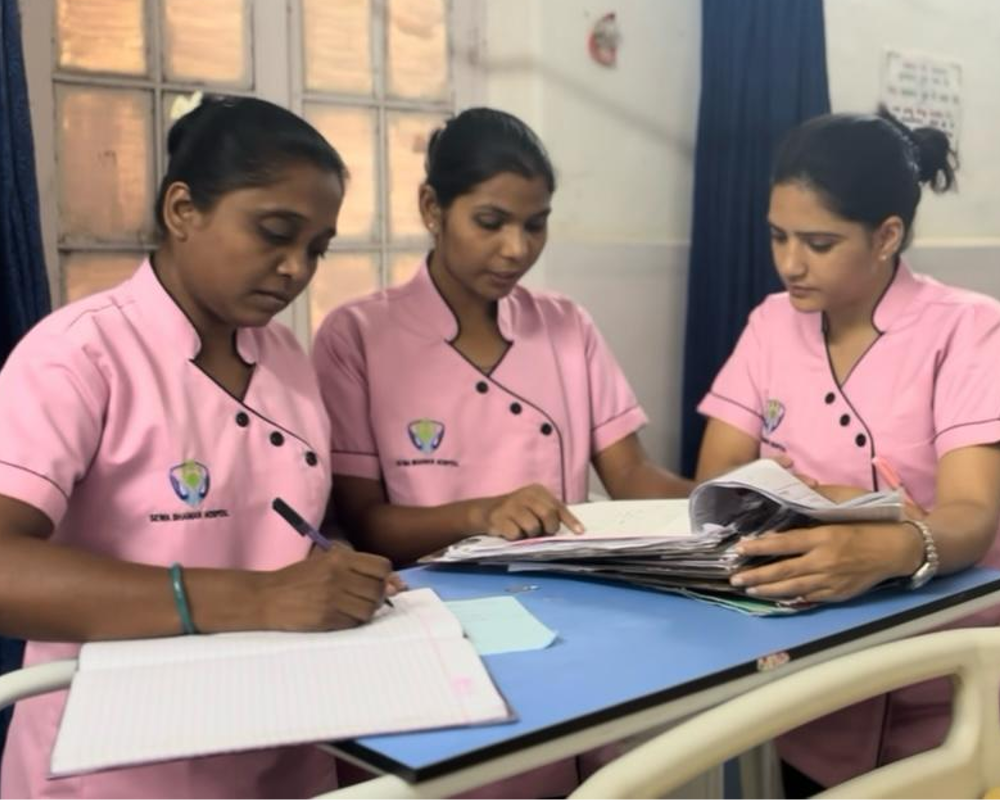
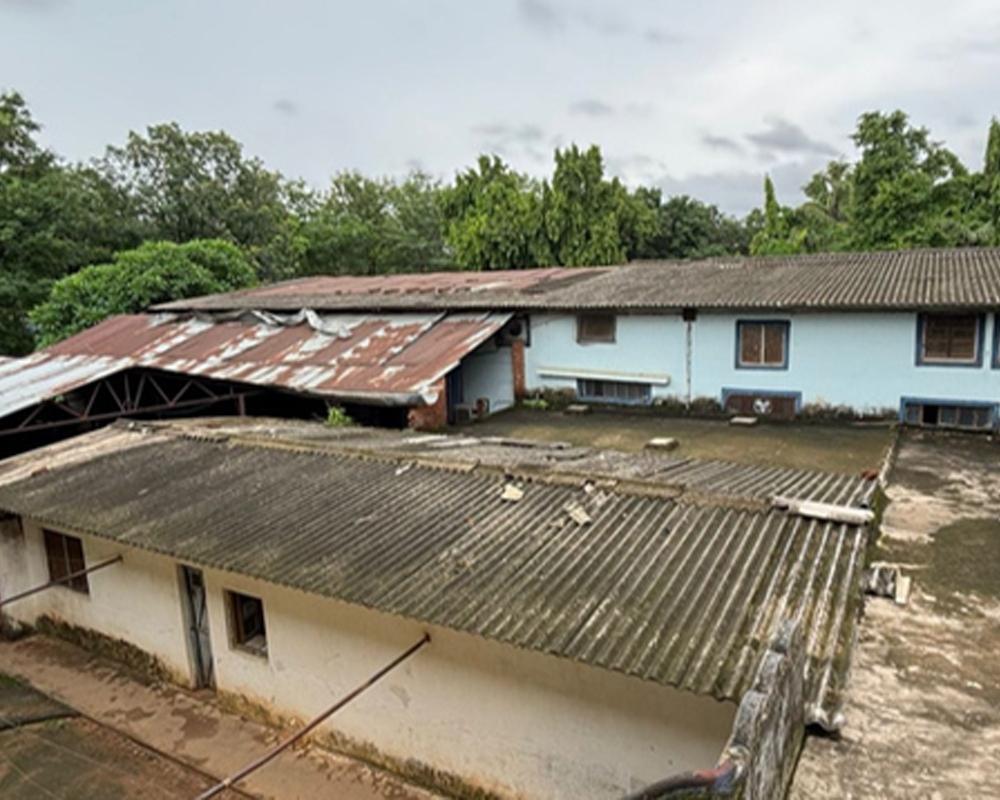

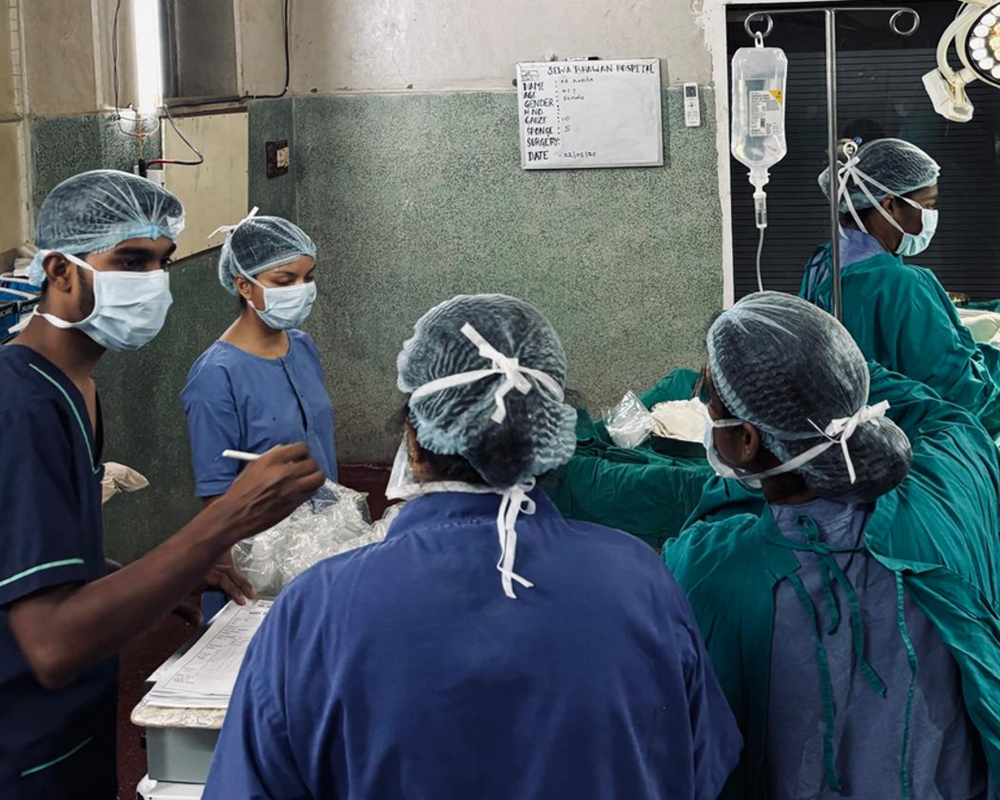
Located in central India in the state of Chhattisgarh, Sewa Bhawan Hospital has a small staff of 4 doctors, 30 nurses, and 37 other workers. With just 50 beds, SBH cares for 14,000 outpatients and 2,500 inpatients each year. The staff are pleased to be able to manage complicated OB/GYN cases and newborn care, offer intensive care to patients who need it, and take advantage of the better diagnostics they can offer with a new CT machine.
However, many of SBH’s buildings are old and dilapidated, as you can see below. The main medical ward has a damaged roof. Many of the staff housing units are falling apart and need repair. They lack funding to be able to upgrade or replace these facilities. Other major needs include a vehicle to drive out to the communities to offer medical and palliative care, as well as a freezer/mortuary.
Please pray that a pediatrician, a radiologist, and a general doctor would join their team. If you feel led to support Sewa Bhawan, please click the button in the top right corner of this page.
Surviving Paralysis and Pneumonia
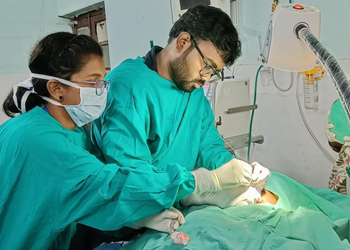

Kishan was just 19 when he decided to end it all. Feeling desperate, he drank pesticide until he fell unconscious. Kishan was brought to Sewa Bhawan Hospital by his family, and the medical team flew into action.
He faced multiple life-threatening complications, including paralysis and pneumonia.
After 32 days in the ICU, where he experienced dedicated care and intensive treatment, he made a full recovery and walked out of the hospital.
Kind staff counseled Kishan and his father, offering them both healing and hope for his future. He’s on the road to a new life now.
All It Took Was a Goat
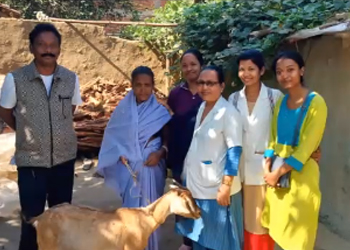
All of EHA’s 19 hospitals run projects in their communities not only to provide medical care, but also to help with advocacy for government benefits, assist those with disabilities, and teach better agricultural and other income-generating skills, among other things. Sewa Bhawan Hospital is no exception. One service they offer is palliative care. The hospital staff go out into the villages to find people suffering with long-term or terminal illness.
They found one man who was suffering through the final stages of oral cancer, while his wife, Kanti, was about to give birth to their sixth child. This family was out of money because of the cancer treatment they had sought, and Kanti felt helpless. During the time that the staff was working with them, the husband died and Kanti lost her unborn baby. She was grief stricken and inconsolable, and the staff stood by her. They sat Kanti down and asked how they could help her provide for the family and pay off their debt.
Kanti decided that she wanted to rear goats, so the staff gave her a she-goat with two kids. In this way, they provided her with a livelihood to sustain herself and her children, as well as a chance to gain financial independence. The staff were satisfied to know that this family would feel valuable and be cared for. Many times, the outreach of EHA staff goes way beyond hospital care.
Loss of Leg Brings New Lease on Life
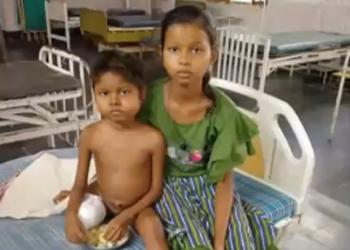
Eight-year-old Darshana came to Sewa Bhawan Hospital in critical condition. She had a serious infection in her lower-right leg, which had caused septic shock and acute injury to her kidneys. Darshana had been unconscious for a day, and her leg was badly swollen. Contributing to this critical situation, she was malnourished, weighing only 29 pounds when she should have weighed at least 44.
In speaking with the mother, the pediatrician, Dr. Annie, found out that Darshana had four sisters and her father had died about the time that the youngest girl was born. The mother was supporting the family by working in a small shop and doing day labor. When Darshana was born, she had a spinal defect that required immediate surgery, but for financial reasons, she didn’t have the operation until age two, and no follow-up was done. Consequently, Darshana had some paralysis in her legs and couldn’t walk properly.
Darshana was experiencing overwhelming needs, but the medical team prayed and took her in for surgery. Unfortunately, it was necessary to amputate her leg above the knee. Afterwards, she miraculously woke up right away and began speaking.
Darshana is in the hospital for a long stay, with only her older sister to look out for her since her mother needs to care for the three younger girls. The hospital staff are working to improve Darshana’s nutrition levels and are helping her gain some much-needed weight. Eventually, they will fit her with a prosthesis and give her therapy to adjust to it. All of this medical treatment and loving care by the staff is being done at a significantly reduced cost because the mother has little ability to pay. It is the doctors’ desire to all work together for holistic healing to transform this family, who in turn will be an example to others in the community.
Update on Sewa Bhawan Hospital
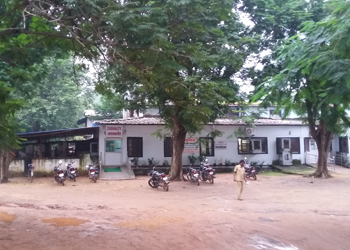
EHA’s Sewa Bhawan Hospital is located in Jagdeeshpur, which is in the state of Chhattisgarh in northeast India. The next closest hospital is nearly 100 miles away, and few patients in this area have the means to travel far.
In this environment, Sewa Bhawan seeks to provide quality health care at an affordable cost. With 100 beds, 10 doctors, and 36 nurses, they diligently care for 3,450 inpatients and 16,000 outpatients each year. The doctors deliver about 1,450 babies annually and perform about 1,400 surgeries.
Their greatest infrastructure needs are for an ICU, a NICU, a new labor room, and a general ward.
If you feel led to help meet these needs, please click the green button on the top right of this page.
From Attempted Suicide to Advocacy
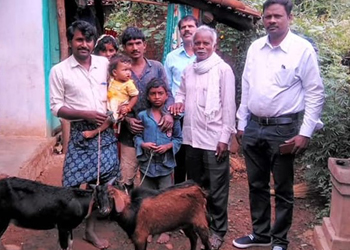
Ahibal, a 28-year-old tribal man, was rushed 28 miles to the emergency department of Sewa Bhawan Hospital. His attempt to commit suicide had left him in critical condition. The doctors there assessed him and encouraged his family to take him to a more advanced facility. But without an ambulance with life support equipment, transporting Ahibal wasn’t really an option.
Lacking a mechanical ventilator, the staff at Sewa Bhawan were forced to keep Ahibal breathing with a manual bag and a mini lung ventilator. His treatment stretched out for weeks, and the doctors and nurses cared for his every need, including counseling. After 45 days in the hospital, Ahibal was ready to go home. It was a joy for the medical staff to see him reunited with his family.
Now Ahibal is enrolled in the hospital’s mental health livelihood initiative for suicide survivors. The project has enabled him to provide for his family by raising goats. Thankful for all the help he has received, Ahibal actively works to share information about mental health awareness and substance abuse prevention. EHA has helped bring true transformation in this young man’s life and provided him with practical skills to change his future.
SBH in Need of New Ultrasound Machine
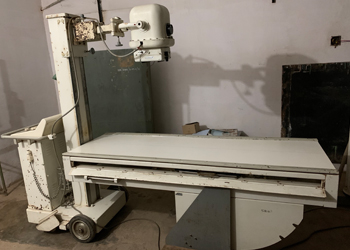
Despite the COVID-19 pandemic and the havoc it has wreaked in India, the general medical and surgical caseload is rising at Sewa Bhawan. The staff is working very hard, but they have limited resources and equipment.
They have a new radiologist and are in desperate need of diagnostic equipment. You can see on the left how dilapidated their old ultrasound machine is. Recently they have had many cases that they simply couldn’t treat because they weren’t able to get the internal imaging they needed.
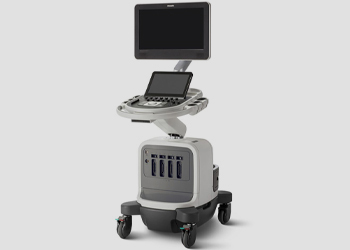
After checking with various experts, they have chosen the best ultrasound machine to purchase for the broadest medical uses. The initial price they were quoted was $65,ooo. After speaking with the manufacturer about their status of offering charitable healthcare, the company lowered the price to $44,000, and it includes an additional two-year warranty!
Won’t you help Sewa Bhawan to purchase this key equipment? Please click the button below and choose SBH in the drop-down menu.
New Staff Boost Sewa Bhawan Hospital’s Services
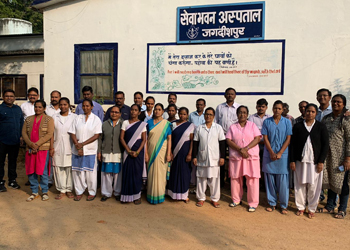
In recent years, the small but mighty team at Sewa Bhawan Hospital in Jagdeeshpur, North India, has struggled to keep the facility going. On their knees in prayer, they petitioned God for a financial turnaround and for a full medical team, including a gynecologist and radiologist. He answered their prayers in the form of husband-and-wife team Dr. Timothy Chelliah, radiologist, and Dr. Bina Timothy, OB/GYN. Then, in January of 2020, Dr. Divya, surgeon, and Dr. Alvin, medical officer, joined the team at Sewa Bhawan. Amazingly, a cardiologist and a pediatrician have committed to serve at the hospital starting next year as well. God has abundantly supplied the medical specialists this hospital needed!
Since these staff joined, the patient numbers have been growing at the hospital, despite COVID-19! The staff have been working hard to care for patients with many different kinds of medical conditions, but they are severely limited by a lack of equipment and outdated facilities. The biggest need at the moment is a new ultrasound machine. You can see the state of the old one in the article above. Imagine trying to do accurate diagnostics on that old dinosaur! If you feel led, please click on the button to contribute to a new ultrasound machine for Sewa Bhawan.
Mushroom Farming Raises Income
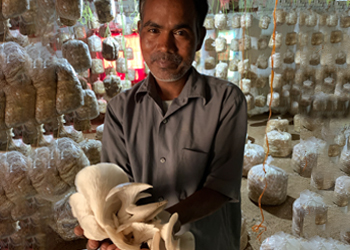
Sewa Bhawan is a 90-year-old campus located on 30 acres of arable land. Desiring to use their resources wisely, staff at the hospital have grown such crops as onions, potatoes, radishes, tomatoes, corn, spinach, and cabbage. These vegetables are given away to poor patients and the rest is sold to the staff. More long-term crops have also been developed, such as lemon trees, dragon fruit plants, and mango trees. (The choice of crop is dependent on what the local monkeys will stay out of!)
Recently, community staff have also begun to empower women and youth, as well as others in need of income, by teaching them how to cultivate mushrooms as a cash crop. Since growing mushrooms does not require access to land, cultivation is accessible to all. Using plant husks as the base, farmers need few raw materials to grow their mushrooms. Keeping the whole system in plastic bags ensures retention of moisture for successful germination and growth. After just five days of training by community staff, these new farmers are able to grow significant quantities of fast-yielding and nutritious mushrooms to supplement their diet and their income.
Poisoning Victim Is Saved
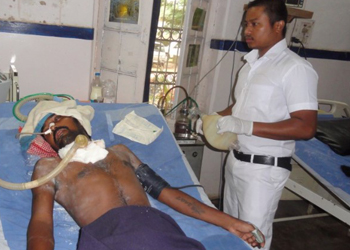
Though not fully equipped for emergency medicine, Sewa Bhawan Hospital sometimes receives patients in critical condition. If the need for medical attention is urgent, some patients have the best hope of surviving if they remain at the hospital. Kabir was one such patient. A 32-year-old breadwinner, he suffered poisoning by breathing in too much insecticide.
Unable to remove him from life support for transport to a larger hospital, the staff decided to keep Kabir in critical care. For 22 days and nights, he fought to hold on to his life. Seeing little improvement, the surgeon performed a tracheostomy. He spent another 25 days in the hospital, slowly regaining strength after the procedure.
Both his father and grandfather stayed by his side day after day, hoping desperately for his recovery. As these two men spent many weeks at the hospital, the staff shared their faith in God with them and they responded positively. As he rested in the hospital, Kabir began to understand the power of God and also put his faith in him, even before he could speak again. Eventually Kabir fully recovered and was able to return to work. His simultaneous physical and spiritual healing is a testimony to the faithfulness of God and his work through the Sewa Bhawan staff.
Impending Tragedy Turns to Blessing
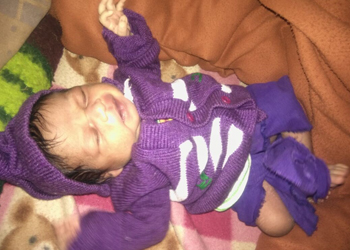
As the staff at Sewa Bhawan Hospital was getting ready for church one Sunday morning, they were called to the labor and delivery room for assistance with a patient in desperate straits. Droupati Binjwar, a 22-year-old tribal woman, had been brought in from a village 35 km away and abandoned at the hospital by her husband. Her only companions were her four-year-old son and her elderly mother-in-law. Neither was in any place to help Droupati with what she really needed—a blood transfusion. Severely anemic, Droupati was not likely to survive this delivery without having some healthy blood infused into her body.
In India, anemia continues to be one of the key challenges contributing to maternal and neonatal mortality in both the antenatal and postnatal care periods. EHA works to spread awareness about the importance of antenatal checkups, as well as nutrition intake and immunization. Determined to help Droupati safely deliver a healthy baby, EHA staff jumped into action, contacting a distant blood bank to obtain a transfusion, arranging for donors, and sending a driver to pick it up. Once the transfusion was taken care of, the doctors worked with Droupati to carefully deliver her baby. An incident that could have ended in tragedy instead culminated in the birth of a beautiful baby girl, thanks to God and the tireless efforts of the Sewa Bhawan doctors and nurses.
Determined to solve the difficulty surrounding the lack of availability and affordability of blood, Sewa Bhawan has since applied for and received permission to start a blood bank at their location. Since the state of Chhattisgarh has very high rates of anemia, especially among women and children, this new facility will help save lives like Droupati and her infant for years to come.
Bedridden Patient Appreciates Care
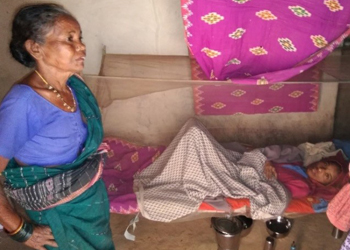
Palliative care improves the quality of life for patients and their families who are facing physical, psychosocial, or spiritual problems associated with a life-threatening illness. EHA’s programs are designed for those suffering from a terminal illness or from a complicated long-term illness where symptoms need to be controlled. Sewa Bhawan offers home-based care supported by hospital services to those in need of their treatment in a 10-kilometer radius around the hospital. Patients like this woman, who has been bedridden for 15 years, are very thankful for the care provided by Sewa Bhawan’s team.
Experiencing Complete Turnaround
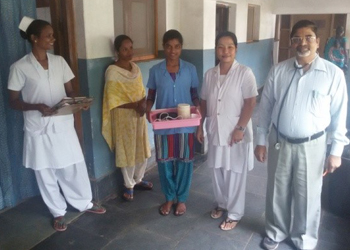
Two years ago we shared the story of 18-year-old Anupama with you. She was found semi-conscious with an empty bottle of pesticide nearby. Knowing she had tried to commit suicide, her family rushed her to EHA’s Sewa Bhawan Hospital.
Immediate treatment was begun by the staff, but a poor prognosis was given to the family. Anupama was cared for and prayed over for ten days, and slowly she recovered. During her stay at the hospital, she and her family heard about God and heard the daily prayers in the ward, and they put their trust in the healing power of God. Once Anupama was well physically, Sewa Bhawan staff provided some counseling and it was discovered that she had been cheated on in a relationship, which caused her to attempt suicide. After she accepted God, she went home with a peaceful heart.
Sewa Bhawan’s family physician, Dr. Paneer Selvam, along with a local evangelist, visited her home four miles away from the hospital, and the family gladly received them for prayer. Anupama’s extended family members living in the area also believed in God. Now, by God’s grace, Anupama is completely recovered, has forgiven her betrayer, and there is a worship group meeting in her home every week.
She has completed 12th grade and is now employed at Sewa Bhawan as an aide in the hospital ward. Now she is at the forefront, sharing with others who have attempted suicide how God has given her hope. Everyone at the hospital is thankful that God used their staff to reach Anupama, and now she is reaching others for Him.
Bitten by a Cobra
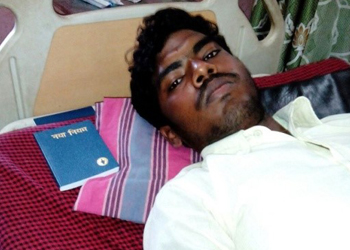
Twenty-eight-year old Kannaiah Ram was working in his fields when he was bitten by a cobra. He was rushed to Sewa Bhawan’s casualty department, but by the time he arrived, his eyes were drooping and his breath was labored.
The staff began to pray, gave Kannaiah the entire stock of anti-venom they had on hand, and put him on a ventilator. With no improvement in the next 24 hours, they asked the family to take Kannaiah to a more advanced medical facility, but they did not have the finances to do so. The staff continued to pray and give supportive treatment.
After five long days, Kannaiah began to show signs of improvement and was able to come off of the ventilator. He readily accepted God’s love when it was shared with him and is now a regular attender at one of Sewa Bhawan’s house churches.
Miracle Twins
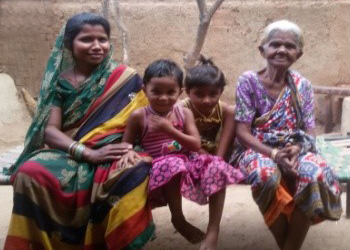
Three years ago, Sarita arrived at Sewa Bhawan Hospital in shock. As she was wheeled into the labor room, the hospital staff noted that her pregnancy was full-term and she was bleeding profusely.
The midwife in Sarita’s village had tried all day to deliver her baby but was unsuccessful. When she became unconscious, she was brought to the hospital with a hemoglobin level of 4 gm (normal is 12-15 gms). Facing a high-risk surgery, the doctors and nurses began to pray. The surgeon found that she was pregnant with twins and her uterus had ruptured. Miraculously, Sarita and both babies survived.
She and her family believe that God healed her, and three years later, they are a happy family worshipping God.
On the Brink of Death
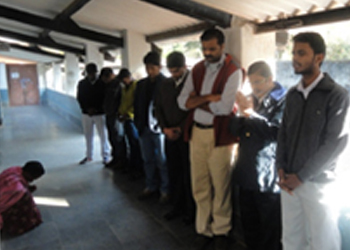
Her family found the young woman lying semi-conscious with an empty bottle of pesticide nearby. Knowing she had attempted to commit suicide, Anupama was rushed to Sewa Bhawan Hospital by her relatives.
Immediate treatment was begun by the staff but a poor prognosis was shared with the family. Anupama was cared for over a ten-day period and she slowly recovered. Once she was well, they provided some counseling and discovered that she had been cheated on in a relationship which caused her to attempt suicide. The love and encouragement provided by the hospital staff turned her life around, and she went home at peace.
The Community Health Department has extended their outreach from 60 to 85 villages to help villagers who have attempted suicide and provide them with counseling. They have begun a referral system to help these poor and marginalized patients.
Growth at Sewa Bhawan Hospital
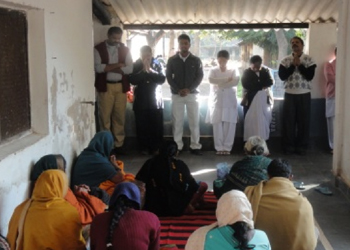
A year ago, the two senior consultants at Sewa Bhawan Hospital left, leaving a hole in the staff coverage. The number of patients dropped from 120 patients to 25 in the outpatient department and from 35 to 17 patients in the inpatient department. The remaining staff faced challenges in the areas of patient care and clinical services.
But in April of 2014, a doctor couple arrived at Sewa Bhawan and began to minister. Soon an eye consultant came on board and full-fledged eye services were available. Now the hospital is slowly regaining its goodwill and patients are returning for treatment. They are again able to deliver surgical, medical, gyne, and ophthalmic services to the community surrounding the hospital. EHA staff are thankful for the growth in team members and services.
Mystery Illness Diagnosed and Treated
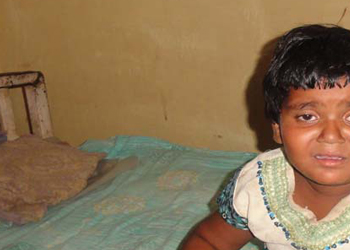
The doctors had no idea what was wrong with her. A six-year-old girl came in to the emergency room with breathlessness and acute pain in her abdomen. Emergency measures were administered, but her condition worsened. Determined to find the cause of her illness, the doctors discussed her case, prayed, and then met with the mother.
One fact the mother mentioned was that the girl had gone late at night to urinate, and had gone outside rather than to the toilet. Checking her eyelids, the doctors began to suspect a toxic snake bite. Time was running short, so they administered anti-snake venom while praying and explaining the situation to the parents. By the grace of God she responded within two hours and was discharged in two days. The doctors were thankful for receiving the enlightenment needed to solve this case.
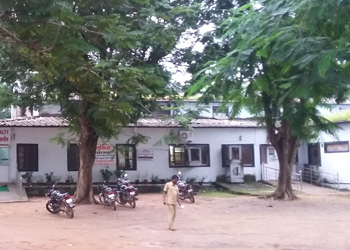
About Sewa Bhawan Hospital
What was once a dispensary built to serve the people of Mahasamund district of Chhattisgarh is now a 50-bed hospital providing many heath care services. Today Sewa Bhawan Hospital serves nearly 200,000 poor and marginalized people scattered over 300 villages with surgical, ophthalmologic, orthopedic, and pediatric services. They conduct numerous eye camps in various locations each year.
In the Community Health and Development Projects, almost one hundred community-based organizations (CBOs) are active in almost twenty villages. Some of these organizations are self-help groups, some are farmers’ clubs, and others are youth groups. One project they have worked on is renovating and constructing water resources. When wastelands are reclaimed, the food security of vulnerable families is established. These CBOs operate seed banks to enable farmers not to take loans from money lenders at high rates. Working along with government and non-government agencies, the community projects have been able to improve the condition of healthcare for women and children. Institutional deliveries and immunizations are more common now, while the infant mortality and maternal mortality rates have dropped.
Another Community Health and Development Project has done extensive work in the area of Reproductive and Child Health (RCH), and has increased immunization coverage, antenatal care, institutional deliveries, and use of spacing methods for family planning. They also plan to work with infertility issues. In addition to RCH, this project has also worked to replace and install hand water pumps to vastly improve drinking conditions in villages. Cleaning drainage systems also improves quality of life for these villagers.
In all they do through the Sewa Bhawan Hospital and the CHD Projects, staff seek to reach out to the lost with the love of God. In helping meet practical needs of healthcare and village water supplies, they gain a platform to share with hurting people.
